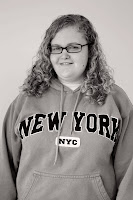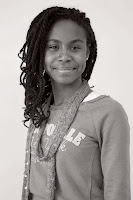Monday, March 28, 2011
Almost time
It's starting to feel a little surreal that this trip is not even 2 months away. The group is really starting to come together. We are now in the process of actually teaching our lessons to the class, I am so impressed with the level of dedication that everyone has put into this so far. I already know that the kids will love the fun, interactive experiments that we will be conducting. Another great feeling that is becoming more real now is how we will impact these kids lives. Since they do not have a hardly any science curriculum, these three weeks can possibly induce a greater love for learning new things. In my opinion, the main reason for living is to help others, I feel great knowing that I am holding true to my philosophy, and I am sure that the rest of the group feels the same way.
Thursday, March 24, 2011
The Other Half....
 Being a US college student, I had not invested too much thought in how young people abroad learn about their physical world. My assistance for the group heading to Caminante this summer has driven me to dive head first into the issue. The experience of finding out the degree of education for those living in Caminante was a sobering reminder that many youth lack the resources to capitalize on their potential. I was told that my lesson on the solar system would be given to children considered years behind in schooling by US standards. Designing the lesson has become an unconventional problem solving task. I plan to teach the students about earth rotation, day/night cycles, and time zones. Most American youth take this knowledge for granted, while children in Caminante have no clue why the sun rises in the morning. The problem to be solved is working from the ground up. With this audience, lessons must start in the simplest way. These children do not have the fortune of a strong education and this affects their receptiveness to learning otherwise foreign concepts. Instead of catching these students up to their American counterparts, I hope this lesson will inspire at least one student to become a motivated learner. These children lack economic freedom, but a newly cultivated drive to understand may give them better prospects and vitalize their sense of youth.
Being a US college student, I had not invested too much thought in how young people abroad learn about their physical world. My assistance for the group heading to Caminante this summer has driven me to dive head first into the issue. The experience of finding out the degree of education for those living in Caminante was a sobering reminder that many youth lack the resources to capitalize on their potential. I was told that my lesson on the solar system would be given to children considered years behind in schooling by US standards. Designing the lesson has become an unconventional problem solving task. I plan to teach the students about earth rotation, day/night cycles, and time zones. Most American youth take this knowledge for granted, while children in Caminante have no clue why the sun rises in the morning. The problem to be solved is working from the ground up. With this audience, lessons must start in the simplest way. These children do not have the fortune of a strong education and this affects their receptiveness to learning otherwise foreign concepts. Instead of catching these students up to their American counterparts, I hope this lesson will inspire at least one student to become a motivated learner. These children lack economic freedom, but a newly cultivated drive to understand may give them better prospects and vitalize their sense of youth.Steve Palaia
Monday, March 21, 2011
Progress
The trip to the Dominican Republic is quickly approaching and there has been great progress on the science lesson plans being created for the trip. In the course Science in the Dominican and Haiti, students have been working on every thing from geography and earth science to the heart and the human body. Each lesson is designed to be fun and interactive with the children of the Dominican Republic yet still being educational. Most lessons are designed, to be reusable in years to come, lesson material will be left behind for teachers and students have been conscientious of using materials that could also be found in the Dominican Republic. These lessons are particularly important to help give the under privileged children of the Dominican Republic the opportunity to learn things they normally wouldn't get the opportunity to learn.
Thursday, March 17, 2011
Benefits of Service Learning?
I went to a fascinating talk by Doug McAdam last night. I didn't know how relevant it would be to our class . If I did, I would have recommended it to everyone. He compared the Freedom Summer project (an effort to register black voters in the South in 1964) to the modern day Teach for America program. Unlike the Freedom Summer project, the Teach for America program seems to have had little impact on the level of civic engagement or service activity for those who participate. To be clear: graduates of the program are very civically active, but those who chose to accept a position in the program were no more active than those who turned it down. In other words, these folks were inclined to be active before they ever served.
So this raised questions about service learning more generally. One of the growing assumptions in service learning has been that we should concentrate as much, if not more, on how service transforms those doing the service, rather than how it helps those being served. Last night, I was convinced otherwise: we need to double-down and worry more about how well we complete our projects!
So this raised questions about service learning more generally. One of the growing assumptions in service learning has been that we should concentrate as much, if not more, on how service transforms those doing the service, rather than how it helps those being served. Last night, I was convinced otherwise: we need to double-down and worry more about how well we complete our projects!
Tuesday, March 15, 2011
Global Reach
This course has been one of the most rewarding classes that I have taken at Hiram College. Hiram has always valued itself on intimate learning and global reach. For the first time, I personally feel like I am accomplishing Hiram's moto. I truly feel that the lesson I am creating will impact the young children in the Dominican Republic. Hopefully, having them learn about their heart will spark an interest in science or at least have them think science is "cool." Personally, I feel that the activities I have planned are AWESOME! They are learning how to take their own pulse, listening to their own heart beat with a stethoscope, and about the importance of exercise. Not only will learning about the heart be eductional but the lessons I have created can help build healthy skills.
Wednesday, March 2, 2011
Real Life and Geoscience
In January of 2010, a massive earthquake struck Haiti and the effects were disastrous on the already poor nation. Since Haiti is so close to the Dominican Republic and my lesson will be teaching the kids about earthquakes and tsunamis , I decided to obtain my father’s perspective on life in Haiti after the disaster. My father went on a mission’s trip to Haiti this past summer.
What was the condition in Haiti while you were there?
Haiti was really bad. The effects of the disaster were still very much present. The buildings were still a heap of rubble and those intact still had major damage. No repairs had been made, only clean-up of the dead bodies.
The food donated to Haiti was in storage and with lack an organized way to distribute the food, it had not been given to the citizens yet.
What were the people’s living conditions like?
Many lived in tent-cities (land full of tents) or slept on top of their house for fear of another earthquake coming. They cooked their food on open fire (campfire) and washed their clothes in rivers and streams.
How did the people react?
Other than fear of another earthquake coming, the Haitians were very strong-willed. They were focused on moving forward and had resumed daily life. No sense of sadness was shown, they were just expecting God to bring them a miracle. The kids were cheerful but still concerned and hoping for assistance, they weren’t certain of their next meal.
It was amazing hearing the stories of the resilience of the Haitians despite the unfortunate circumstances they are experiencing. I really hope that their country will be restored. I cannot imagine having to live in a tent or sleeping on top of a roof for fear of another earthquake. I cannot even begin to imagine walking down the street everyday and seeing the damage or remembering the nightmarish event daily.
I hope that teaching the children at Caminante about earthquakes and tsunamis will teach them of the disaster they heard about in Haiti. I hope the lessons prepare them in case an earthquake or tsnumani hits them at home. I hope they will understand that earthquakes are no one’s fault and are not punishments. I’m glad we will be able to teach something so relatable to life that is sometimes misunderstood. Hopefully the trip to Dominican Republic will not only change the students and faculty’s lives but also open the children’s eyes to the world around them.


What was the condition in Haiti while you were there?
Haiti was really bad. The effects of the disaster were still very much present. The buildings were still a heap of rubble and those intact still had major damage. No repairs had been made, only clean-up of the dead bodies.
The food donated to Haiti was in storage and with lack an organized way to distribute the food, it had not been given to the citizens yet.
What were the people’s living conditions like?
Many lived in tent-cities (land full of tents) or slept on top of their house for fear of another earthquake coming. They cooked their food on open fire (campfire) and washed their clothes in rivers and streams.
How did the people react?
Other than fear of another earthquake coming, the Haitians were very strong-willed. They were focused on moving forward and had resumed daily life. No sense of sadness was shown, they were just expecting God to bring them a miracle. The kids were cheerful but still concerned and hoping for assistance, they weren’t certain of their next meal.
It was amazing hearing the stories of the resilience of the Haitians despite the unfortunate circumstances they are experiencing. I really hope that their country will be restored. I cannot imagine having to live in a tent or sleeping on top of a roof for fear of another earthquake. I cannot even begin to imagine walking down the street everyday and seeing the damage or remembering the nightmarish event daily.
I hope that teaching the children at Caminante about earthquakes and tsunamis will teach them of the disaster they heard about in Haiti. I hope the lessons prepare them in case an earthquake or tsnumani hits them at home. I hope they will understand that earthquakes are no one’s fault and are not punishments. I’m glad we will be able to teach something so relatable to life that is sometimes misunderstood. Hopefully the trip to Dominican Republic will not only change the students and faculty’s lives but also open the children’s eyes to the world around them.


Subscribe to:
Posts (Atom)



